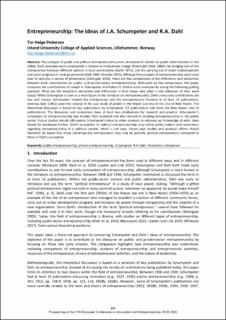Entrepreneurship: The ideas of J.A. Schumpeter and R.A. Dahl
Peer reviewed, Journal article
Published version
Permanent lenke
https://hdl.handle.net/11250/3065067Utgivelsesdato
2022Metadata
Vis full innførselSamlinger
Originalversjon
Proceedings of the European Conference on Innovation and Entrepreneurship, ECIE. 2022, 400-407.Sammendrag
The concepts of public and political entrepreneurship were introduced in relation to public administration in the 1960s. Early examples were constructed in relation to institutional change (Eisenstadt 1964; 1980), the bridging role of the entrepreneur between different spheres in local communities (Barth 1972), and the carrying out of urban redevelopment and social programs in local government (Dahl 1961; Murphy 1971). Although the concepts of entrepreneurship were used later to describe a variety of phenomena (Sheingate 2003), there are few comparisons of the differences and similarities between early contributions on public- and private-sector entrepreneurship. Motivated by few comparisons, this paper compares the contributions of Joseph A. Schumpeter and Robert A. Dahl as early examples by asking the following guiding question: What are the important similarities and differences in their ideas—and what is the relevance of their work today? While Schumpeter is seen as a main figure in the literature on entrepreneurship, Dahl’s very early contributions are less well known. Schumpeter treated the entrepreneur and the entrepreneurial function in at least 15 publications, whereas Dahl (1961) used the concept in his case study of power in the Mayor Lee–era of the city of New Haven. The theoretical discussion is based on key publications by Schumpeter (15 publications) and from the New Haven case (4 publications). The discussion and comparison have at least two implications for research and practice. Schumpeter’s conception of entrepreneurship was broader than expected and also relevant in studying entrepreneurship in the public sector. Future studies should still explore Schumpeter’s ideas in other contexts to enhance our knowledge of what ideas should be developed further. Dahl’s conception of political entrepreneurship may inform policy makers and researchers regarding entrepreneurship in a political context, which is not easy. Future case studies and practical efforts should therefore be aware that many contemporary entrepreneurs may only be partially political entrepreneurs compared to those in Dahl’s conception.
Beskrivelse
Copyright the authors, 2022. All Rights Reserved.
